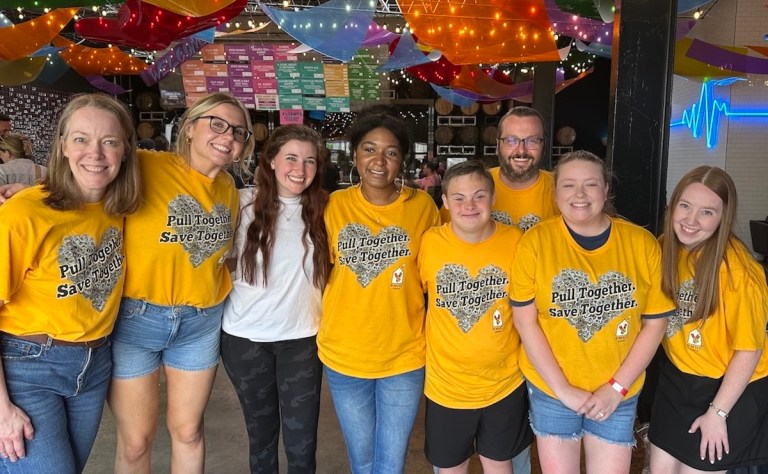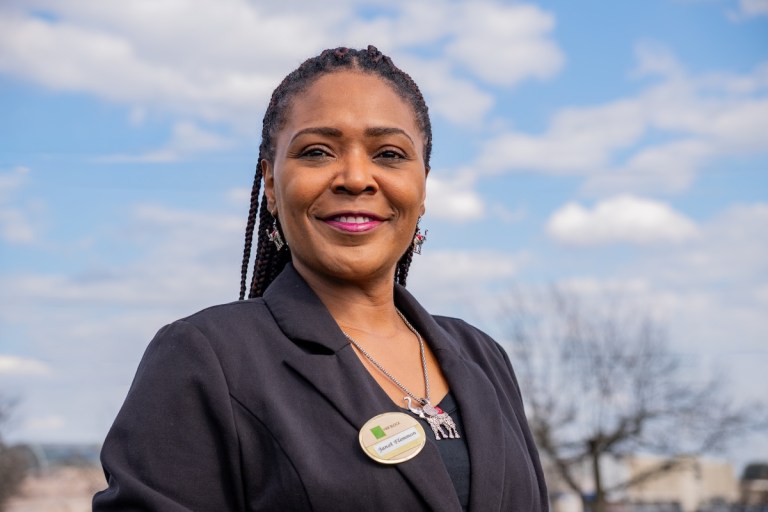Reviewed by: Sharron Swain
Meet 2 people improving their community with AIDS Alabama
Reading time: 5 minutes
Sponsored

Do you love promoting health education and helping marginalized people find community? AIDS Alabama has plenty of ways to help you do that right here in Birmingham.
They’re gearing up for the U=U campaign to promote the “undetectable equals untransmittable” message which means that if HIV is treated successfully, your viral load can be so low as to eliminate your risk of transmitting it to another person.
We spoke to one educator and one advocate who each play a key role in bringing HIV education to our communities—keep scrolling to find out what we learned and how you can get involved.
Meet Bamba—who knows from personal experience how crucial HIV education is

Miguel Angel Anaya, affectionately known as Bamba, was on site at a painting job when his leg got stuck in the ladder after he fell.
At the hospital, he tried to communicate that he was allergic to penicillin, but since he speaks Spanish, the medics did not understand and gave him penicillin anyway.
57 days later, Bamba awoke to two pieces of bad news: he had lost his leg, and he was HIV-positive.
While he was in the hospital, Bamba’s girlfriend left him. When he got home, he leaned on his church for support, but when members learned he was HIV-positive, he faced a new stigma. Since they didn’t know the facts behind HIV transmission, they were afraid they would catch the virus from simply being around him.
Even through the heartbreak from those he once relied on, Bamba remains appreciative of this experience.
“Even though saying this is very tough, I’m grateful now that it’s happened. If I didn’t have this condition I would not have the opportunity to tell my story to you.”
Miguel Angel Anaya “Bamba”
Years later, Bamba returned to the hospital with a different mission in mind: he was going to help educate the public, specifically the Latinx community, and make sure his story didn’t happen to someone else.
“Our culture is sometimes afraid. We see this all the time, ‘I don’t want to test for HIV’ or ‘I don’t know how.’ It’s because of the lack of education. We need to educate people, teach them what HIV really is and let them know all the services we have for people living with HIV.”
Miguel Angel Anaya “Bamba”
Carmarion Anderson-Harvey is a fierce advocate for the mission of AIDS Alabama

Sharing her talents with the larger community as a board member for AIDS Alabama, Carmarion Anderson-Harvey describes her role as a fierce advocate.
To provide the resources AIDS Alabama is known for, it’s important that they make sure everyone is seen. This community is diverse, so their representation needs to be diverse.
“The work that I do for LGBTQ equality rights, social justice, health and holistic healing is really just my call to remain on the frontline–it’s a passion for me.
I think that’s the beauty of being on the board of AIDS Alabama. To have an opportunity to see representation and be more inclined to know that resources are prioritized based off the need. It makes for a great, diverse board that mirrors the population our data has shared with us.”
Carmarion D. Anderson-Harvey, Alabama State Director, Human Rights Campaign, board member, AIDS Alabama
Undetectable = Untransmittable

To prevent experiences like Bamba had, AIDS Alabama is launching a local U=U campaign to educate the general public that people living with HIV on effective treatments do not sexually transmit HIV. U=U is a global community of HIV advocates, activists, researchers and 800+ partners.
Even though the Southeast only accounts for about 1/3 of the U.S. population, 53% of new infections come from our region each year. These new infection rates are driven by social determinants of health.
When needs like housing, health insurance, employment or transportation are not met, it becomes more difficult for people living with HIV to maintain “undetectable” status. That’s why AIDS Alabama focuses on providing wraparound social services to their clients.
According to AIDSVu, there were 4,515 people living with HIV in Birmingham in 2020.
How to get involved in AIDS Alabama’s services + programs

If you’re interested in AIDS Alabama’s services and programs, here’s how to access them:
- Call 205.324.9822.
- Visit AIDS Alabama in person at 3529 7th Ave S, Birmingham, AL 35222.
- Visit AIDS Alabama’s website for more info.
- Follow AIDS Alabama & El Centro/The HUB: Birmingham on Facebook.
Passionate about providing health education to your community? You can further serve this mission by:
Your contributions, whether through money or service, are directly helping people with HIV/AIDS live healthy, independent lives.
Together we can end HIV in Alabama
AIDS Alabama hosts countless events to promote their mission and differentiate HIV facts vs. myths. You can check out this list of events, and catch their team at Sidewalk Film Festival, August 21-27!
Bamba explained how even through his pain, he learned to trust people again. With a special shoutout to his translator Jean Hernandez, Bamba expressed that he found a rescue at AIDS Alabama.
“All of the things I’ve gone through just make me stronger. Make me the person that I am today. Makes me an advocate, so we can have more inclusion and eliminate barriers that come along.”
Miguel Angel Anaya (Bamba)
Learn more about AIDS Alabama and the many ways they are helping those in the Greater Birmingham Area. Visit their website and follow them on Facebook and Instagram.
Sponsored by:




